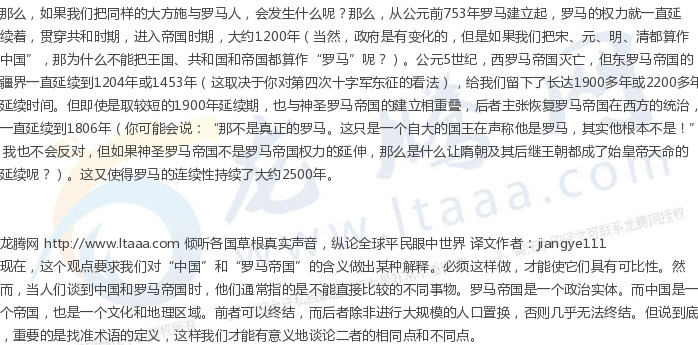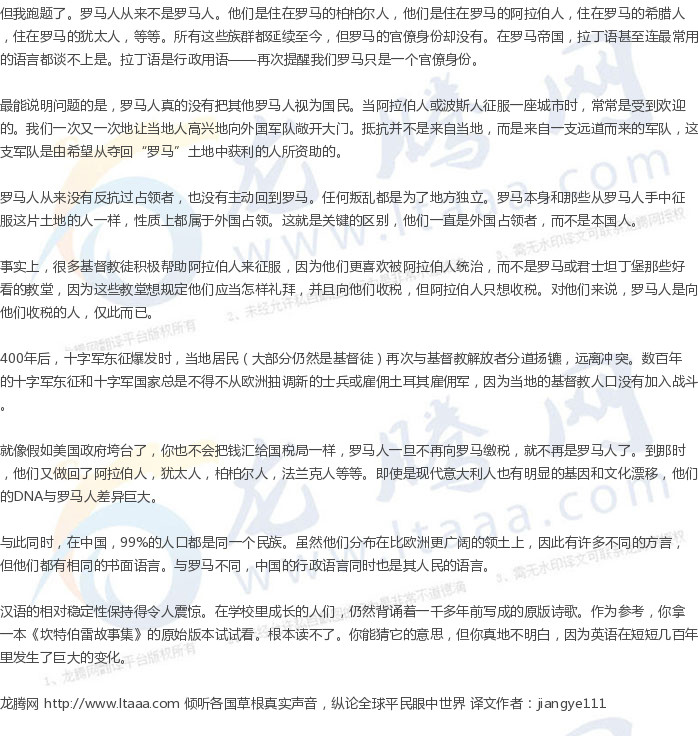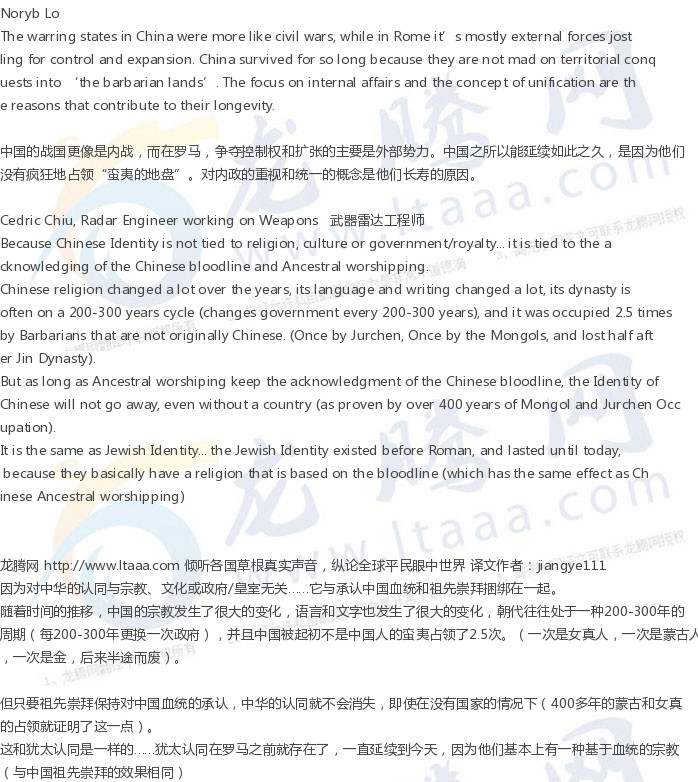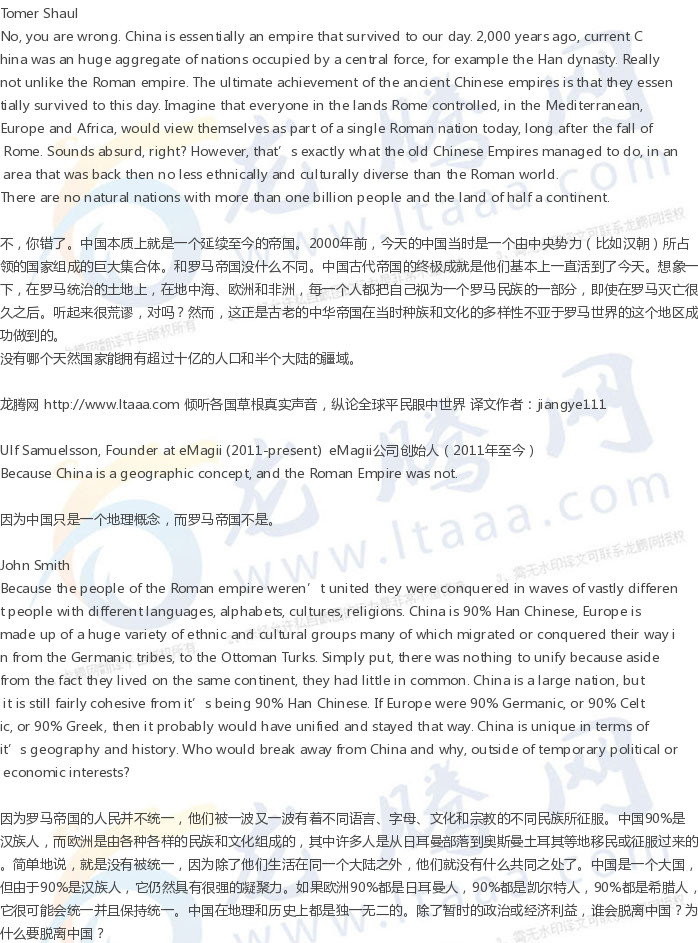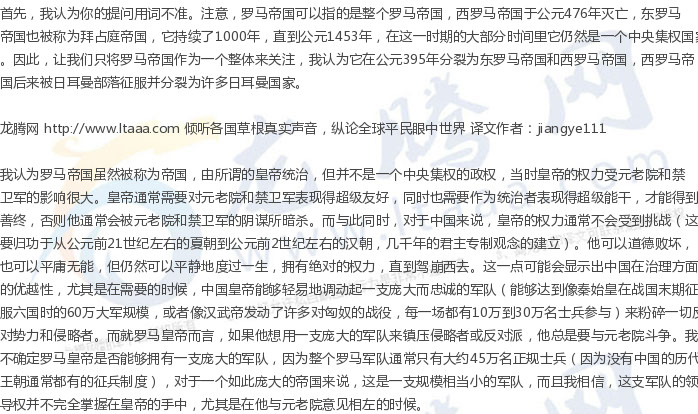为什么与罗马帝国不同,中国能够延续2000多年至今? [美国媒体]
quora网友:这个提问里包含了一堆错误。在中国方面,中国从一个单一中华国家的意义上讲,并没有延续2000年。中华帝国开始于公元前221年,当时秦始皇征服了六个邻国,建立了我们称之为“皇帝”的权力位置。他的王朝很短暂,但其后的汉朝延续并进一步发展了帝国......
Why, unlike the Roman Empire, has China survived for more than 2000 years?
为什么与罗马帝国不同,中国能够延续2000多年至今?
Matt Riggsby, MA Archaeology, Boston University 波士顿大学考古硕士
There’s a stack of things wrong here.
On the Chinese side, China, in the sense of a single Chinese state, has not lasted for 2000 years. The Chinese empire started in 221 BC when the king of Qin conquered six neighboring kingdoms and created the office which we translate as “emperor.” His dynasty was short lived, but was followed by the Han dynasty, which extended and further developed the empire. The Han collapsed in 220 AD and, crucially, China went with them. From 220 until around the 580s, China, as a state, did not exist. The geographical region we recognize as China contained a greater or lesser number of quarreling kingdoms. It was reunited under the Sui, followed shortly by the Tang, and then…China fell apart again. There was an interregnum of another several decades before the Song reunited China again. From that point in the late 10th century on, there was a continuity of a Chinese state which lasts to the present day, but even if we combine several different empires which claim to be the same entity despite being different foundations, we’re looking at around 1900 years, and that’s being a bit generous.
So what happens if we apply the same generosity to the Romans? Well, there was a continuity of Roman authority starting with the foundation of Rome around 753 BC, running through the republic and into the imperial period, a period of about 1200 years (certainly, there are shifts in government, but if we’re counting the Song, Yuan, Ming, and Qing as all being “China,” why aren’t we counting the kingdom, republic, and empire as all being “Rome”?). In the 5th century AD, the western half of the empire fell, but there was a direct continuity of the Roman imperial line in the east until—depending on how one feels about the 4th Crusade—either 1204 or 1453, taking us to either a bit over 1900 years or 2200 years. But even the shorter date overlaps with the establishment of the Holy Roman empire, claiming a resumption of the Roman imperial line in the west, lasting until 1806 (“That’s not really Roman,” you may say, “It’s just some jumped-up king claiming to be something he’s not!” And I wouldn’t disagree, but if the HRE isn’t an extension of Roman imperial authority, what makes the Sui and everybody who followed an extension of the first emperor’s mandate of heaven?). That gives that continuity an age of about 2500 years.
Now, this particular take requires that one make certain interpretations of what “China” and “the Roman Empire” mean. One must do so in order to make them comparable. However, when one speaks of China and the Roman empire, they’re usually used to mean different things which can’t be directly compared. The Roman empire is a political entity. China is an empire, but also a cultural and geographical region. The former can end, while barring large-scale population replacements, the latter almost can’t. But ultimately, it’s important to define terms so we can speak meaningfully about similarities and differences.
这个提问里包含了一堆错误。
在中国方面,中国从一个单一中华国家的意义上讲,并没有延续2000年。中华帝国开始于公元前221年,当时秦始皇征服了六个邻国,建立了我们称之为“皇帝”的权力位置。他的王朝很短暂,但其后的汉朝延续并进一步发展了帝国。公元220年汉朝灭亡了,而至关重要的是,中国也随之而灭亡了。从220年到大约580年,中国作为一个国家并不存在。我们所承认的“中国”的地理区域包含了或多或少的互相交战的王国。中国在隋朝统一,紧接着是唐朝,然后……中国再次分裂。在宋朝再次统一中国之前,又过了几十年的空档期。从位于10世纪末期的这个时间点开始,中国国家的延续才一直到今天,但即使我们合并了几个不同的帝国(它们声称是同一个实体,尽管基础不同),我们也只看到了1900年左右,而且这(种算法)还算有点大方了。
Adam Johnson, UX/product consultant 用户体验/产品顾问
Rome was always a bureacratic identity. China was always a cultural one. Cultural identities can last forever, bureaucratic ones die with the regime.
First of all, Matt Riggsby is just outright wrong. It doesn't surprise me that someone who also wrote that the Great Wall was a logistics network for chariots would be wrong on other things. There's good reason why he disables comments on his answers.
His argument is that China didn't exist during fractured states or dynastic change. But then - even though Rome literally had the same things happen - he hand waves that away and doesn't even acknowledge it happened. Rome had many “warring states” periods and multiple dynasties. In fact, most dynasties were of a single ruler or two. The only reason why we don't count Rome by dynastic eras is that there would be dozens of them but in China it's a neat and succinct list. Han, Tang, Song, Ming, & Qing pretty much covers about 80% of the last two millennia so we gravitate to those epoch markers out of simplicity.
He then calls a Germanic federation using some PR as the continuation of Rome despite largely occupying a population and territory that was never part of Rome. I'm shocked he didn't also include Czarist Russia, who claimed to be the Third Rome as well. Basically he's super stringent in viewing Asia but anything goes in Europe. It's not just inconsistent, it's beyond rational thinking.
But I digress. Romans were never Romans. They were Berbers who lived in Rome, they were Arabs who lived in Rome, Greeks that lived in Rome, they were Jews that lived in Rome, etc etc etc. All those ethnic groups survive today but the Roman bureaucratic identity didn't. Not once in the Roman Empire was Latin even remotely close to being the most commonly spoken language. Latin was the language of administration - again reminding us of Roman being a bureacratic identity.
Most tellingly, the Romans really didn't view other Romans as countrymen. When the Arabs or Persians conquered a city, it often was welcomed. Time and time again we have local populations happily opening their gates to the foreign armies. Resistance came not locally but from a far off army paid for by someone hoping to cash in on taking back the “Roman” land.
Never did the Romans rebel against any occupiers and voluntarily go back to Rome. Any rebellions were for local independence. Rome itself was just as much a foreign occupation as those who conquered the land from the Romans. That's really the key distinction, they were always the foreign occupiers, never the countrymen.
In fact, many Christians actively aided the Arab conquest because they'd prefer to be under the Arabs than the sightly different churches of Rome or Constantinople because those churches wanted to dictate how they should worship and collect taxes but the Arabs just wanted to collect taxes. The Roman was the tax collector to them and nothing more.
400 years later when the crusades happen, again the local population (that's still mostly Christian) basically divorces themselves from their Christian liberators and stay out of the conflict. Hundreds of years of crusading and the crusader states always had to import new soldiers from Europe or hire Turkic mercenaries because the local Christian population didn't join in the fight.
So much like you wouldn't still send money to the IRS if the United States government collapsed, the Romans ceased being Romans once they were no longer paying taxes to Rome. At that point they went back to being Arab or Jew or Berber or Frank or what have you. Even modern Italians have had significant genetic and cultural drift that their DNA is very different from that of the Romans.
Meanwhile, in China, it was 99% just one ethnic group. While they were spread out over a territory larger than Europe and thus had many different spoken languages, they all shared an identical written language. Unlike Rome, the language of administration was the language of the people as well.
The relative stability of the Chinese language is astonishing. People still grow up in school reciting poetry in it's original form that was written over a thousand years ago. For reference, pick up a copy of Canterbury Tales in original text. It's unreadable. You can guess at the meaning but you really have no idea because the English language changes so dramatically over just a few hundred years.
Whan that Arcite to Thebes comen was,
Ful ofte a day he swelte and seyde `Allas,'
For seen his lady shal he nevere mo;
And shortly to concluden al his wo,
So muche sorwe hadde nevere creature,
That is, or shal whil that the world may dure.
His slep, his mete, his drynke is hym biraft,
That lene he wex and drye as is a shaft.
Then try to read Beowulf, the first “English” publication from just a few hundred years prior.
Hwæt. We Gardena in geardagum,
teodcyninga, trym gefrunon,
hu ea ætelingas ellen fremedon.
Oft Scyld Scefing sceatena treatum,
monegum mægtum, meodosetla
Good luck with reading that “English” poem. Honestly, the only reason why English is likely to remain relatively stable today is the printing press and now the internet.
China doesn't have this fluidity if language. Yes, reading by the classics will be difficult for them and they'll often be trained in how to do it, but the changes they encounter reading something 1,500 years old is about equivalent to is reading Shakespeare, it's weird, you're not quite sure but with some thought it will make sense. It's never like Canterbury Tales or Beowulf where is basically an entirely different language.
Then you have genetics. China regularly does does DNA sampling at archaeological digs and the results are pretty astounding. The DNA is basically the same as that of modern Chinese. This is unheard of elsewhere in the world. It's so profound that when they excavate non Han Chinese from an ancient site, they immediately label them as captured slaves. Many Shang Dynasty burial sites have what have been labeled as slave pits:
Hundreds of captured slaves were typically executed during a renji ceremony,usually via decapitation. The corpses of the victims, along with their severed heads, were buried in mass sacrificial pits
So in Rome you have hundreds of different ethnic groups and languages under one bureacratic identity. In China you have one ethnic group and one language so their bureacratic and social identity is one and the same.
When the government collapsed the people moved on in Europe and established new governments under their cultural identities. In China, if the government collapsed, it'd be replaced by a new government that was still Chinese.
罗马始终是一个官僚体制的国家。而中国一直是一个文化大国。文化认同能永远持续下去,而官僚国家会随着政权的更迭而消亡。
首先,Matt Riggsby完全错了。能写出“长城是战车的运输网络”的人(译注:在该网友对其他提问的回答中提到的),在其他方面也能写错,我对此不感到惊讶。他关闭自己回答的回复功能是有“充分理由”的。
他的论点是:在国家分裂或王朝更迭时期,中国是不存在的。但是后来——尽管罗马确实发生了同样的事情——他却挥挥手,甚至不承认所发生的事情。罗马有许多“战国”时期和多个朝代。事实上,大多数朝代都只有一两个统治者。我们不按朝代来计数罗马的唯一原因在于,它们的数量多达几十个,但在中国,朝代变成了简洁明了的列表——汉、唐、宋、明、清就几乎覆盖了过去两千年的80%,所以我们被这些时代标记所吸引,因为它们简洁明了。
然后他把日耳曼联邦称为罗马的延续,尽管日耳曼联邦在很大程度上占据了一部分从未属于罗马的人口和领土。我很惊讶他居然没有把沙皇俄国也包括在内——沙皇俄国也声称自己是“第三罗马”。基本上,他看待亚洲极其严格,但欧洲怎么都行。这不仅是不一致的,而且超出了理性的思考。
(译注:古英语段落节选。完全看不懂)
祝你读这首“英语”诗哥读得愉快。老实说,英语在今天保持相对稳定的唯一原因是因为有了印刷机和当今的互联网。
中国没有这种语言的流动性。是的,阅读经典对他们来说是困难的,他们经常会被训练如何去做,但是他们在阅读1500年前的作品时所遇到的语言变化,相当于阅读莎士比亚作品的难度(可以接受)。完全不像《坎特伯雷故事集》和《贝奥武夫》一样变成了风马牛不相及的语言。
然后是基因。中国经常在考古发掘现场进行DNA取样,其结果令人震惊。考古DNA与现代中国人的DNA基本相同。这在世界其他地方是闻所未闻的。它是如此的影响深远,以至于当他们从一个古老的遗址挖掘出非汉人时,他们就立即把他们标记为被俘获的奴隶。许多商代的墓葬都有奴隶坑:
数百名被俘奴隶通常在人祭仪式上被处决,通常是斩首,受害者的尸体连同他们被砍下的头颅一起埋在大规模的祭祀坑中
所以在罗马,在一个官僚体制下有几百种不同的民族和语言。而在中国,只有一个民族,一种语言,所以他们的官僚主义和社会认同是一致的。
当政府垮台时,欧洲人民继续前进,并且以他们的文化身份建立了新的政府。在中国,如果政府垮台了,它将被一个仍然是中国的新的政府所取代。
Tony Zhu, Studies Chinese History and History of the Ancient World 研究中国历史和古代世界历史
I would attribute the continuity of the Chinese state much as a result of geography and its impact on Chinese history for better or worse.
It’s not like Chinese dynasties have lasted more than two millennia, a general pattern throughout history we see is that any particular state experiences rise, apex, and decline in a centuries-long cycle. But what distinguishes China is the fact that each successor, whether this is a unified state or splinter kingdoms carries more or less the same cultural identity. Barbarian conquerors quickly become integrated into the local culture, while dynasties of origin from within carry the same mantle. Examples for the first include the Mongols, Jurchens, Xianbei. Examples of the second are how most dynasties carry the same cultural baggage.
Why does this happen? I think it’s attributable to geography precisely because of two things: the population distribution between at first the yellow river region compared to everywhere else because a centralized state arose first out of the need for flood control and irrigation (like Mesopotamia) and later the current productive farming regions in China which largely correspond to its core territories. Secondly because of the natural barriers that meant the extent of Chinese civilization, and the nomads in its vicinity that were never able to form a state of equivalent power without invading China.
Shang Dynasty, Ming Dynasty, Current Crop Production, Natural Barriers
我认为中国国家的延续性很大程度上是地理因素及其对中国历史影响的结果,好处坏处都有。
延续了2000多年的并不是中国的朝代,纵观历史,我们看到的一个普遍模式是,任何一个特定的国家都会经历一个长达数百年的兴衰周期。但中国的不同之处在于,每一个继承者,无论是统一的国家还是分裂的王国,都承载着或多或少相同的文化认同。蛮夷征服者也很快融入了当地文化,而来自本土的朝代则肩负着同样的使命。前者的案例包括蒙古人,女真人,鲜卑人。后者的案例包括大多数朝代都背负着相同的文化(传承)包袱。
为什么会这样?我认为这正是由于地理原因,因为两点:首先,黄河流域的人口分布与其他地区相比,因为一个集中型国家首先产生于对防洪和灌溉的需要(就像美索不达米亚),并且中国今天的生产性农业区在很大程度上与其核心领土是相对应的。其次,由于天然屏障保证了中国文明的范围,并且其周围的游牧民族在不侵略中国的情况下,永远无力形成一个具有同等实力的国家。
商、明、今天中国的农业生产状况,天然屏障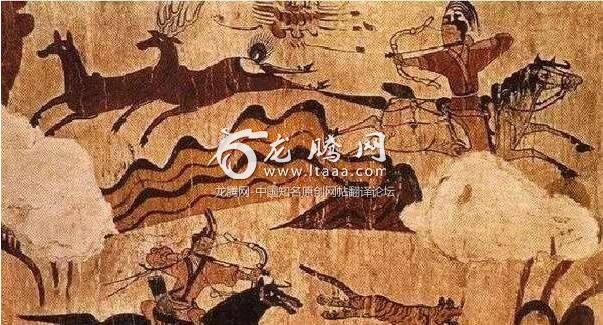
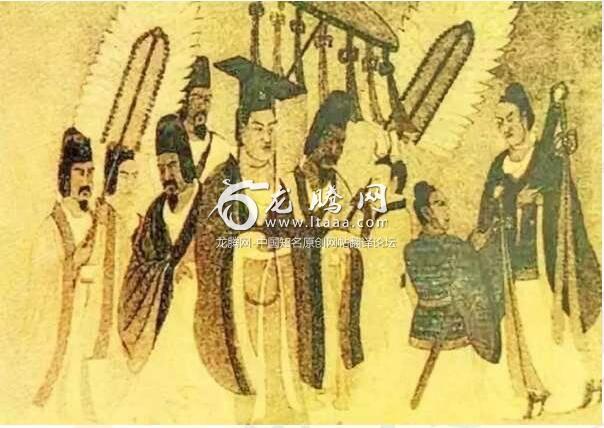
Jamie Cawley, Author of 'Beliefs and the World they have created', 2015 and 'The Birth of Now' 2015年《信仰及其创造的世界》和《现在的诞生》的作者
I disagree with Matt Riggsby. China as a unity - seen as ‘All Under Heaven’ is an idea that has persisted since at least 221BCE and consists roughly speaking of the eastern half of modern China surrounded by tributary states. Obviously it has had a turbulent history but the idea of a unified civilised middle-world has persisted throughout.
The Roman Empire lived in the mind much longer than most people realise. The Eastern half was finally defeated with the fall of Constantinople in 1453 and the Holy Roman Empire, a ghostly title of the Empire in the West went on until 1806 when Napoleon took it down. It had a reality though, under Charlemagne and Frederick Barbarossa, right through the Middle Ages.
China has a much more unified geography than Europe: tundra to the North, desert to the West, mountains to the South and sea to the East. And it has one written language, which I think is critical in keeping it unified.
So those are the two main reasons. There are others to do with climate and ease of movement but these two will do.
我不赞同Matt Riggsby的观点。中国作为一个整体——被视为“普天之下”,这一理念至少从公元前221年起就一直存在,它大致包括了现代中国的东半部分,并且被朝贡国所环绕。显然,它经历了一段动荡的历史,但一个统一的文明的“中央王朝”的理念一直贯穿始终。
罗马帝国存在于人们思想中的时间比大多数人意识到的要长得多。随着1453年君士坦丁堡的陷落,东罗马最终被击败,神圣罗马帝国——这个在西方如亡魂一般的帝国头衔——一直延续到1806年,直到拿破仑将其终结。尽管在查理曼大帝和腓特烈•巴巴罗萨的统治下,它都是现实存在的,贯穿了中世纪。
中国拥有比欧洲统一得多的地理特征:北边是苔原,西边是沙漠,南边是群山,东边是大海。并且它只有一种书面语言,我认为这是保持中国统一的关键所在。
以上就是两个主要原因。还有其他一些因素,与气候和行动便利有关,但这两个因素就能促成国家的延续了。
Alex Marquès, fascinated by history and literature 对历史和文学着迷
The Eastern half of the Roman Empire did last 1,500 years. However, it’s true that China has built and unbuilt the Empire, assimilated Mongol and Manchu dynasties and in fact kept that huge chunk of Asian land together for arguably 2,500 to 3,000 years. China introduced very early on a system for civil service with examinations that was instituted all over the state. Another factor of cohesion was that, in lieu of a common language, China uses a common writing system which is ideographic, allowing people who speak different languages to read the same texts. Of course these things alone cannot explain the longevity of the country, and its boundaries have varied and several periods of fracture have occurred, but I think that, in the main, we can consider that centripetal forces have maintained the Chinese civilization as a continuous project in spite of the centrifugal forces that kept it from becoming a homogeneous nation-state. Perhaps if they had attempted to impose one language and one religion they would have disappeared long ago.
罗马帝国的东半部分持续了1500年。然而,中国也确实建立和解散了帝国,同化了蒙古和满族王朝,并且在2500到3000年的时间里在事实上一直将这片巨大的亚洲土地聚合在一起。中国很早就在全国范围内实行了公务员考试制度。中国凝聚力的另一个因素是,中国使用表意文字的通用书写体系,而不是使用一种通用的口语,这使得说不同语言的人能够阅读相同的文本。当然光靠这些东西无法解释这个国家的长寿,及其边界变化和几个分裂时期,但我认为,总的来说,我们可以认为,尽管离心力阻止了中华文明成为一个单一民族国家,但向心力使中华文明保持了连续性。也许如果当初他们试图强加一种语言和一种宗教,他们早就消失了。
Xiaobo Wang
In my mind the fundamental thing is a Chinese state was always seeking for unification. You can imagine that all European countries are seeking for unification of all European countries and take that as the only mission of the government until it’s done.
在我看来,最根本的原因在于中国一直在寻求统一。你可以想象所有的欧洲国家都在寻求欧洲国家的统一,并把统一作为政府的唯一使命,直到统一完成。
Kevin Anderson
You are confusing “empire”, with the name of a modern, present-day country.
Consider this question: “Why, unlike the Mayan Empire, has Sweden survived for more than 2000 years?”.
你混淆了“帝国”和现代“国家”这个名称。
思考下这个问题:“为什么与玛雅帝国不同,瑞典能够延续2000多年至今?”。
Donatien Alphonse François, former Senior Belly Dancer 前高级肚皮舞演员
My opinion.
Geography. China is surrounded in the east and south by the ocean, beyond which there weren’t any large adversaries, to the south west by the Himalayas, to the west by the Gobi Desert and to the North by Mongolia. Furthermore, proto Chinese culture was centred in the Huangtu Plateau and the North China Plain which fostered unity and one overall continuous culture and language. China was able to evolve and coalesce in relative peace.
Europe is much more geographically fractured than China: Italy is isolated from Europe by the Alps, Spain from France by the Pyrenees, England by the English Channel, Germany also by the Alps and vast tracks of forests. Furthermore, Western Europe is at the end of a vast track of grasslands and temperate zones extending from Mongolia to the Hungarian basin, which fostered major migrations into Europe and is a natural invasion route.
Rome was under contant attack: Celts, Germanic people, Huns, Cartage, Persia, etc… There were never the same kind of unifying forces that existed in China. The best examples are Romance languages, all issue from Vulgar Latin, but all now mutually intelligible due to geographic isolation.
Also, there is no way to compare two entirely different cultures existing in completely different environments.
我的意见如下。
因为地理环境。中国东部和南部被海洋包围,在海洋之外没有任何强大的对手,西南部被喜马拉雅山脉包围,西部被戈壁沙漠包围,北部被蒙古包围。此外,原始中华文化以黄土高原和华北平原为中心,这促进了文化和语言的统一和整体的连续性。中国能够在相对和平的环境中发展和融合。
与中国相比,欧洲在地理上的差异要大得多:意大利与欧洲之间隔着阿尔卑斯山脉,西班牙与法国之间隔着比利牛斯山脉,英国被英吉利海峡阻隔,德国也被阿尔卑斯山脉和大片森林阻隔。此外,西欧处于从蒙古到匈牙利盆地的大片草原和温带的末端,这些草原和温带促进了大量移民进入欧洲,是一条天然入侵路线。
罗马遭到了持续不断的攻击:凯尔特人、日耳曼人、匈奴人、迦太基人、波斯人等等……而在中国从来没有过这种统一的入侵力量。最好的例子是罗曼斯语,它们都起源于粗俗的拉丁语,但由于地理上的隔离,它们现在只能说能够相互理解。
而且,在完全不同的环境中存在的两种完全不同的文化是无法比较的。
Tal Aviram, worked at Israel Defense Forces (2014-2017) 在以色列国防军服役(2014-2017)
Short Answer:
1、China grew as an expanding core from the earliest ages of civilised history, to be the largest nation in the world throughout all of its history. The massive and gradual expansion is the reason for their large borders actually, with the lack of real conteders in China proper.
2、Romans were smart but small nation with successful government and some great leaders. This along with other conditions allowed them to take over the Italian Peninsila, and then expand further and inherit the Hellenistic and Carthaginian civilisations. They did not grow into what became the Roman world. They took over it in a quick process of 200 years. Prior to them were different peoples and cultures, and so has been after them. They did have contenders in their surroundings. Roman entity was immediatley challenged with varied Germanic entities and later some Slavic and Arabian, after its collapse.
Not quite short after all…
简短的回答:
1、中国从文明史上最早的时代起就有一个不断扩张的核心,在其历史上一直是世界上最大的国家。这种大规模的、渐进式的扩张,实际上是造成他们疆域广大的原因,而且中国本身缺乏真正的竞争对手。
2、罗马人很聪明,但国家小,政府成功,有一些伟大的领导人。这些特点和其他条件一起使他们得以占据了意大利半岛,然后进一步扩张并继承了希腊和迦太基文明。他们没有发展成后来的罗马世界。他们在200年的快速进程中接管了它。在他们之前有不同的民族和文化,在他们之后也有不同的民族和文化。他们周围确实有竞争者。罗马实体在崩溃后,立即受到了日耳曼实体以及后来的斯拉夫和阿拉伯实体的挑战。
但毕竟延续时间也不算短了……
Hieu Trung, Bachelor Civil Engineering (2015) 土木工程学士(2015届)
Firstly, I think your question is not precisely worded. Note that Roman empire can be refered to either Roman empire as the whole, Western Roman empire which collapsed in 476 AD, and Eastern Roman empire also called Byzantium empire which lasted for thousand years until 1453 AD and remained a centralized power thoughout most of that period. So let’s just focus on Roman empire as a whole which I believe was broken into Eastern and Western Roman empires in 395 AD, and Western Roman empire which actually later conquered and separated by Germanic tribes into many Germanic states.
I think Roman Empire though called Empire and ruled by so called emperor was not quite a centralized authority when the power of the enperor was influenced a lot by the senate and the Praetorian guard. The emperor usually needed to be both supernice to the senate and Praetorian guard and super-competent himself as a ruler in order to live and die peacefully, otherwise he could usually end up being assassinated by plots of Senate and Praetorian guard. Meanwhile, for China, the power of the emperor was usually unchallenged (thanks to thousands year of building up the concept of absolute monarchy from Xia dynasty in around 21th century BC to Han dynasty in 2nd century BC). He can be both morally depraved and incompetent, and still can live through his life quite peacefully and have absolute power till the end of his days. That might show the superiority in governance in China in comparison to that of Rome especially, in time of need, the Chinese emperor can easily mobilize a huge loyal army (which can be 600 thousands troops like under Qin Shi Huang in his conquest of the 6 other kingdoms in the late Warring States period or many campaigns each of which involved from 100 000 soldiers to 300 000 soldiers against Xiongnu under Emperor Wu of Han) to crush any opposition and any invaders. While for Roman emperor, he always struggled with Senate if he wanted to use a huge army to crush invaders or opposition. I am not really sure whether Roman emperor can have a huge army either since the entire Roman army just usually included around 450 000 professional soldiers (with the nonexistence of the conscription like dynasties in China usually had) that was fairly small army for an empire of that size, and the leadership of that army was not entirely under the emperor hand, I believe, especially when he was not in the same page as the Senate.
Roman empire exercised in large scale slavery so the social tensions were always high between Roman (usually citizens) and non-Roman (usually non citizens and could be brought into slavery at any time). So for non Roman, Roman empire was always their enemy, their suppressor, and they never identify themselves as Roman. While in China, everyone was equally treated as citizens, though they were just peasants and poor. So people can share their national pride and national identity. Hence, if the empire is dissolved, non Roman people would love to see it that way and have zero motive to have the empire back to its full strength because what is the point to have their own suppressors strong while Han Chinese people always wanted their empire back strong and united. Though Roman empire was civilized with a lot of technical and scientific feats, its social structure was about 1000 years outdated in comparison to that of China since China largely abandoned its slavery at the end of Spring and Autumn period (around 6th century BC), while Roman still practiced that horrible system till the collapse of the Western Roman Empire (in 476 AD).
In short, a centralized well established absolute monarchy, a powerful standing army, a flourishing culture valueing education and morality, and an advanced social structure with fair equality among people were factors that made unified Chinese Empires (Qin, Han, Jin, Sui, Tang, Song, Ming, I don’t count Yuan and Qing since they were in fact Empires ruled by the invaders of Han Chinese people, and I think Han Chinese people back then would be happy to see them fall) stayed strong and glorious. In comparison, a system where power of Emperor was limited by a cunning Senate, a society of always sheer tensions, and a fairly weak army contributed to the always instablity and eventual dissolution of the Roman empire.
罗马帝国实行大规模的奴隶制度,因此罗马人(通常是公民)和非罗马人(通常是非公民,随时都可能变成奴隶)之间的社会紧张关系一直很严峻。所以对于非罗马人来说,罗马帝国一直是他们的敌人,是他们的镇压者,他们从不认为自己是罗马人。而在中国,每个人都被平等地对待,尽管他们只是农民和穷人。所以人们可以分享他们的民族自豪感和民族认同感。因此,如果帝国解体了,非罗马人会喜闻乐见,也不会有让帝国恢复其全部实力的任何动机,因为打造一个压制自己的东西有什么意义呢?而汉人却总是希望他们的帝国强大而统一。尽管罗马帝国拥有许多技术和科学成就,但与中国相比,它的社会结构已经落后了大约1000年,因为中国在春秋末期(大约公元前6世纪)就基本上摒弃了奴隶制,而直到西罗马帝国灭亡(公元476年),罗马人还在实行这种可怕的制度。
简而言之,一个中央集权的、建制完善的君主专制政体,一支强大的常备军队,繁荣的教育和道德文化,倡导人民平等的先进社会结构,造就了强大而辉煌的统一中华帝国(秦、汉、晋、隋、唐、宋、明,我不把元、清算在内,因为它们实际上是由汉人的入侵者统治的帝国,我想当时的汉人会很高兴看到它们灭亡)。相比之下,一个皇帝的权力被狡猾的元老院所限制的体制,一个总是处于绝对紧张状态的社会,以及一支相当弱小的军队,都导致了罗马帝国永恒的不稳定和最终的消亡。
版权声明
我们致力于传递世界各地老百姓最真实、最直接、最详尽的对中国的看法
【版权与免责声明】如发现内容存在版权问题,烦请提供相关信息发邮件,
我们将及时沟通与处理。本站内容除非来源注明五毛网,否则均为网友转载,涉及言论、版权与本站无关。
本文仅代表作者观点,不代表本站立场。
本文来自网络,如有侵权及时联系本网站。
上一篇: 非洲正在转变吗? [美国媒体]
图文文章RECOMMEND
热门文章HOT NEWS
-
1
Why do most people who have a positive view of China have been to ...
- 2
- 3
- 4
- 5
- 6
- 7
- 8
- 9
- 10
推荐文章HOT NEWS
-
1
Why do most people who have a positive view of China have been to ...
- 2
- 3
- 4
- 5
- 6
- 7
- 8
- 9
- 10
